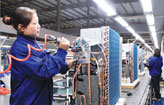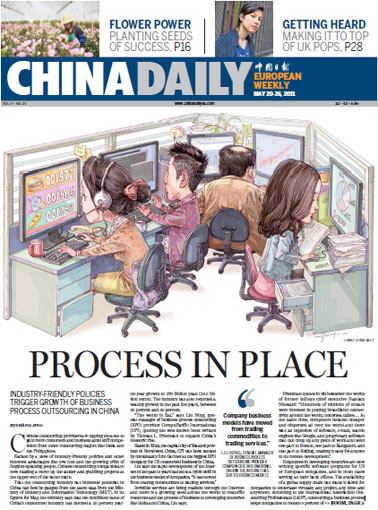Society
Unilever's price rise 'a corporate decision'
Updated: 2011-05-27 07:23
By Ding Qingfen and Wang Ying (China Daily)
Government will not interfere, official says
BEIJING - Unilever's decision to raise the price of some of its products is a "corporate decision", and the government will not punish the company or "interfere" with its business, a senior official said.
But a major priority for the government this year is to control the price of food and daily necessities in cities to combat inflation, Li Qing, deputy director general of the department of pricing supervision at the National Development and Reform Commission (NDRC), said on Thursday.
The Guangzhou Daily reported on Thursday that the consumer products giant raised prices for some body care and beauty products sold in Guangzhou by about 10 percent.
Earlier this month the company was fined 2 million yuan ($308,000) by the authorities for "disturbing the market pricing system" by suggesting price hikes were likely.
"Companies like Unilever have the right to decide whether to raise prices or not, it's their decision. We will not interfere," Li told China Daily.
But the company's move will probably raise concern among consumers and its competitors in the Chinese market, she added.
Senior managers at Unilever China announced on a number of occasions since March that the company would raise the price of some goods in April, even forecasting a new wave of price rises in the cosmetics industry. This led to panic buying in cities.
NDRC officials then met and negotiated with the management of Unilever China and demanded that the company delay any price rises and fined the company 2 million yuan.
Zhu Jianwei, an employee at the communications department of Unilever Shanghai, declined to confirm the Guangzhou Daily report.
But a source at the public relations department of Carrefour Shanghai, the company's Chinese headquarters, told China Daily on condition of anonymity that Carrefour was notified of price rises by Unilever in mid-May for all major cities.
The price rises concerned shampoo, body care and bath gel.
"Unilever finally raised its prices, even after the government asked for a delay," said Qi Xiaozhai, director of the Shanghai Commercial Economic Research Center.
The move shows "Unilever is not a responsible corporation, as everyone knows curbing inflation and controlling prices is a top priority of the government this year", he said.
Many experts agreed that the government should not interfere with company decisions, but suggested that Unilever's fine was too light.
Consumer goods group Procter and Gamble (P&G) and Unilever were fined 315 million euros ($447 million) by the European Commission in April for fixing laundry detergent prices along with Germany's Henkel. Unilever was fined 104 million euros.
"The 2-million-yuan penalty is almost nothing for Unilever. The government used it as a warning," Qi said.
Some experts said Unilever's price hike is not "completely unreasonable" as the costs of raw materials and labor have been increasing in China.
"It (the price rise) is a sort of passive response under the growing pressure of rising costs," said Zhang Jun, a professor of economic studies at Shanghai-based Fudan University.
"But the company has to face the possibility of shrinking market share and decreasing profits as Chinese consumers are very price-sensitive while inflation is high."
Keith Weed, Unilever chief marketing officer, said last month that the company's sales in China had grown by 15 to 20 percent during the five years up to the end of 2010.
Li, from the NDRC, declined to comment on whether Unilever's move will spark a new round of price hikes. "We will wait and see," she said.
A source from P&G said the company has not issued any notice on price hikes. But some media reports claimed that consumer goods and food companies are conducting "invisible price hikes" by reducing packaging and volume while maintaining prices.
"Invisible price hikes are one way to maintain profits," Zhang, of Fudan University, said.
Li said a pressing task this year for the NDRC is to control prices of daily necessities.
China's inflation rate hit a 32-month high of 5.4 percent in March. The government had set a target of 4 percent for this year.
The NDRC has recently met management of cosmetics, alcohol and milk powder companies on price stability.
"The government has many ways to prevent companies like Unilever from raising prices, like tax reduction and subsidy provision," said Zhang.
E-paper

Thawing out
After a deep freeze in sales during the recession, China’s air conditioner makers are bouncing back
Preview of the coming issue
Cool Iron lady
Of good and evil
Specials

Memory lanes
Shanghai’s historic ALLEYS not just unique architecture but a way of life

Great expectations
Hong Kong-born singer songwriter rises to the top of the UK pops.

A diplomat of character
Belgian envoy draws on personal fascination to help build China ties.
